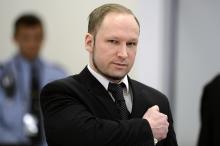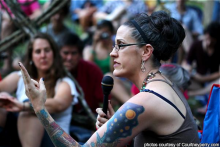Christians

Many of today’s evangelical Christians seem to be taking to heart the words traditionally attributed to St. Francis of Assisi: “Preach the gospel at all times. When necessary, use words.”
Or at least they were at the recent Q Conference here, a gathering of more than a few of the most influential and innovative mover-shakers of the evangelical world.
Over the course of two days in a format similar to the popular TED talks, the speakers spoke passionately more about what they were doing to make the world a better place than they did about getting more butts into pews on any given Sunday.

Unfortunately, Earth Day is rarely celebrated within mainstream Christianity beyond a Sunday sermon, and environmentalism is often frowned upon by evangelical leaders instead of championed. Here are the main reasons Christians have rejected caring for our environment.

A billboard bearing a positive message about atheism has been vandalized — again.
A billboard posted in Chico, Calif., that originally read “Don’t believe in God? Join the club” was defaced on Dec. 12, less than a week after it appeared, with vandals removing the word “don’t.”
The billboard was one of 12 purchased this month by a local chapter of the United Coalition of Reason (UnitedCoR), a national organization that works to unite small, local groups of atheists and other freethinkers.
They are the latest in a long line of billboards erected by atheist groups to draw ire, both locally and nationally. Every national freethought organization that has purchased billboards or bus advertisements in the last five years has reported some form of vandalism or protest.
If the billboards attract negative attention, criticism, and vandalism, why do atheists — a group that polls repeatedly rank among the least-liked group in America — buy them? Are they worth the money and the ill will they cost the groups that buy them?

NAIROBI, Kenya -- Church leaders are pressing the Kenyan government to scientifically test herbal medicines that are used by millions to manage and treat diseases, saying the nontraditional therapies could be putting patients' health at risk.
The leaders say HIV/AIDS patients and others suffering chronic conditions are widely using the medicines, whose efficacy is unknown.
WHEN AMBASSADOR Chris Stevens and other embassy staff were killed in Benghazi in September, it struck close to home for us at Sojourners. The last time a U.S. ambassador was slain was in 1979, when Adolph Dubs, the American ambassador to Afghanistan, was kidnapped by Islamic extremists and later killed. His daughter, Lindsay Dubs, was Sojourners’ managing editor. The degrees of separation between world events and the home front are often slim.
Some attributed last month’s violence in the Middle East to “fanaticism,” a “blind and tragic barbarism” by “imbeciles.” Others used words such as “beyond pathetic,” “fringe,” and “extremists.”
Those descriptions were applied to both those who created the anti-Islam video that provided the spark, and those who used the hateful video as a reason, or excuse, to engage in violent protests against the United States and the “West,” including Israel.
The media repeatedly summarized the cause of the violence as resting in the intentionally offensive video, and said that Muslims, angered by the blasphemous depiction of the Prophet Muhammad, rioted in a blind and uncontrollable rage. Moustafa Bayoumi, writing for the Middle East Research and Information Project, described the process: “Islamophobes provoke. Too many Muslims respond. Non-Muslims believe Muslims are crazy. Muslims are told the West hates them, and the Islamophobic right sleeps well at night with their cozy dreams of a mission accomplished.”

Does anybody else feel this weight?
I woke up this morning in tears. I don’t know why today is different, but I do know the weight is for my brothers and sisters who are in pain.
I imagined what the night was like for folks in my neighborhood who had to fend off threats last night.
I imagine the young girl in a car — against her will or against her first choice — with the guy named John, and I lament for her soul.
I imagine the young guy standing out all night selling death so he can have a little life — whether it’s in the form of food, dignity or just to feel like he is meeting some need, somehow.
I imagine the mom lying in the bed next to someone she would rather not touch, but because he pays the bills for her kids to eat and sleep, she puts up with his abuse and doesn’t say anything about the other woman he also lies with around the corner.

Near the turn of the 2nd century A.D., the poet Juvenal published a collection of verses titled Satires. Among other things, the text was intended to spark discussion about social norms at a time when the masses were increasingly withdrawn from civil engagement.
In specifics, Juvenal wrote:
…everything now restrains itself and anxiously hopes for just two things: bread and circuses.
According to Juvenal, the public of his day and age was growing less concerned about social responsibility due to personal pursuits of bread (comfort) and circus (entertainment). In addition, he believed political leaders used the distribution of comfort and entertainment as a way to sedate the population, distract them, and open opportunities for systemic manipulation.
Juvenal believed far too many citizens were far too willing to cooperate in their own exploitation.
What I find incredibly intriguing — and disconcerting — about Juvenal’s observations is that, numerous generations later, it can be argued that much of what he considered to be problematic in his era can now be found in North America.
I have to admire Melinda Gates' chutzpah.
In her recent TED talk and on her blog, Impatient Optimist, Gates insists that "contraception is not controversial" — when, in the last year, it has been explosively controversial, with many Christians (not just Catholic Christians) seeing the "contraceptive mandate" as a real threat to religious freedom.
Yesterday, the new Affordable Care Act laws took effect, meaning that most employers must now provide free birth control coverage in their health insurance policies. Whether it constitutes a threat to religious liberty and whether remains to be seen — faith-based groups with religious objections to the law have a "safe harbor" until Aug. 1, 2013. Whether HHS will create an extension of this harbor is as yet unknown.
Regular readers of my blog know where I stand on health insurance. As to the contraceptive mandate specifically, I'd prefer not to wade in those particular waters — David Gibson had a good piece if you're interested in the question of whether the mandate kills religious freedom. However, I do want to consider two small points about contraception that lean me toward the (self-identified Catholic!) Melinda Gates point of view:
1. Contraception doesn't take life;
2. Women want contraception.

The view from my office in New York City overlooks Ground Zero. Every day I’m in the office, I have the opportunity to observe the massive construction project as well as the thousands of visitors to the 9/11 Memorial pools. It is all a stark reminder of how a person’s faith can be radicalized and politicalized.
Unfortunately, violence perpetrated by those who have hijacked their faith continues to occur on almost a daily basis.
The Islamist terror group Boko Haram has killed hundreds of Christians in northern Nigeria since 2009. The killings have escalated in recent months, and security forces have clearly failed to protect lives, forcing hundreds to flee for safety.
Earlier this month, al-Shabaab from Somalia attacked two churches in Kenya leaving 17 people dead and scores of people injured, including women and children.
However, attacks are taking place against Muslims as well. Last week an Islamic Center in Missouri was torched. Earlier this year a mosque in Queens was firebombed.
Whether deaths occurred or not, all these acts of violence need to be condemned by all faith leaders.
As a Christian leader, let me specifically address the Muslim-Christian conflict.

One of the things that make America so great is the ability to express yourself, much to the joy, and even pain, of those around you. The freedom of speech is a two-edged sword and more often than not the one who wields it doesn’t fully grasp the power behind it.
Sadly there is no better example of poor usage of this freedom than when directed at the political arena. While late night talk show hosts have always taken shots at the President; now with social media outlets everyone has their two-cents to share … truth is most people would do well to learn the value of biting their tongue.
While I find great joy in the liberty found within the Freedom of Speech, I’ve come to realize that while it’s an American right it’s also much bigger than that … it’s a human right.
However, it’s not a Christian’s right.

After writing up my first list of Ten Cliches Christians Should Never Use, some folks wrote me with other suggestions. After simmering on it for a while, I came up with a second list of ten to supplement the first.
And as there was some confusions from a handful of fellow Christians about the intent of the articles: these are not intended to tell you to believe or not believe a certain set of things. Christians have a Public Relations problem; that much is self-evident. So in as much as I can respond to that, I want to offer these as advice on how to change the way we approach people about our faith.
On to the next ten cliches for Christians to avoid …

We Christians have a remarkable talent for sticking our feet in our mouths. When searching the words most commonly associated with “Christian,” the list ain’t pretty. I think part of this can be attributed to a handful of phrases that, if stricken from our vocabulary, might make us a little more tolerable. Yes, these things may mean something to you, but trust me, non-Christians don’t share your love for these tried-and-true cliches.
So in no particular order, here are ten phrases Christians should lose with a quickness.

I opened up the NY Times homepage yesterday to find this headline: On Witness Stand, Norwegian Says He Would Kill Again. Remember this guy? The Times says authorities have described Anders Behring Breivik as a “fundamentalist Christian…obsessed with what he saw as the threat of multiculturalism and Muslim immigration to the cultural and patriotic values of his country.”
He killed 77 people, including 68 teenagers, in Norway last summer.
Although Breivik admits to the murders, he doesn’t believe he should be held criminally accountable—he believes his actions were preventive measures, or, “self-defense.”
WASHINGTON -- Americans feel the "Christian faith" has a positive impact on help for the poor and raising children with good morals, according to a new poll, but it gets a bad rap on its impact on sexuality in society.
In a new study conducted by Grey Matter Research, more than 1,000 American adults were asked if the Christian faith had a positive, negative, or no real impact on 16 different areas of society, such as crime, poverty and the role of women in society.

Trayvon Martin's slaying has ignited a national discussion on race and privilege.
Many of us recognize that Trayvon’s untimely death is not an isolated incident.
Racial profiling. Discrimination. Enmity. Suspicion. Intimidation. Fear. Hate.
For far too many Americans, these are everyday realities.
As Christians, we are called to fight injustice and work to heal the broken systems — and broken relationships — of the world. We act, with Jesus Christ, to bring about reconciliations — between people, people groups, communities; within (and between) organizations, institutions, and social systems.

My friend, Travis Mamone, did a short video about all the stuff emergent Christians are prone to pop off about. Yeah, he pretty much nails me in it.
Check out Travis’ blog at the link above on his name, and, dig the Something Beautiful Podcast where he’s a co-host.
Love wins.

I know, Christians, love everyone and everything, right? Mister Bluebird on my shoulder and all that jazz.
Well, that ain’t me. Not that I don’t try, but I also don’t try to fake it when I’m not feeling the love.
My wife, Amy, told me that one reason she married me was because she knew she could trust me. It seemed to her that I lacked the capacity to lie. And while this is reassuring on one level, the stark honesty can sometimes be a little jarring, I expect.
What I have found is that naming things out loud is the best way to help you get over them. Some of these might seem like relatively trivial things to you, but trust me – for a quasi-Aspie like me, they are often the bane of my existence.
So without further adieu, here’s a list of things that I can’t seem to shake, they annoy me so incredibly much. God, grant me the serenity to accept the things I cannot change...inside the blog.

LONDON — Christianity is waning in England and could be outnumbered by nonbelievers within 20 years, according to a new study.
The study conducted by the British Parliament showed there were 41 million Christians in Britain, down nearly 8 percent since 2004. Meanwhile, the number of nonbelievers stood at 13.4 million, up 49 percent over the same period.
Researchers at the House of Commons Library concluded that Christianity had declined to 69 percent of the population while those with no religion increased to 22 percent.
"If these populations continue to shrink and grow by the same number of people each year," the study said, "the number of people with no religion will overtake the number of Christians in Great Britain in 20 years."

What is a church?
Is it the stained-glass windows or welcome bell mounted in the steeple? Is it the straight-backed pews or scent of incense wafting into the narthex? Sunday school classrooms or spaghetti dinners in the basement?
If you view a church as a building, what happens when it goes away?
According to Reuters, 2011 was a record year for church foreclosures:
“Since 2010, 270 churches have been sold after defaulting on their loans, with 90 percent of those sales coming up after a lender-triggered foreclosure, according to the real estate information company CoStar Group," the article reads. "In 2011, 138 churches were sold by banks, an annual record, with no sign that these religious foreclosures are abating, according to CoStar.”
